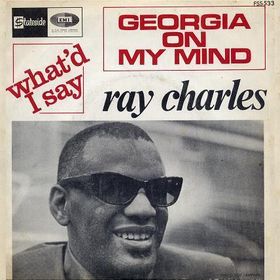That
Spirit of Christmas has flown under my radar despite being a
wonderful seasonal song by one of the most influential artists cut
of the second half of the 20th Century. And I am not the only one—it is seldom played
on those 24/7 Christmas radio stations or included in holiday compilation
album. A big tip-o’-the-hat
to my old friend Sam Jones for posting it on her Facebook
timeline.
Ray
Charles was one of the most iconic and influential singers in history
and was often referred to by contemporaries as the Genius. Among
friends and fellow musicians, he preferred being called Brother Ray.
He
was born on September 23, 1930 in Albany, Georgia as Ray
Charles Robinson, the son of a laborer and seamstress. Charles was blinded during childhood,
probably due to glaucoma. Due to
his mother’s efforts, he was educated at the Florida School for the Deaf and
the Blind in St. Augustine from 1937 to 1945. There he showed unusual musical aptitude and
was trained to play classical piano and read music in Braille.
But
when his mother died in 1945, he left school at age 16 to try and make it as a
working musician in Florida. He gigged
irregularly but began to develop a reputation among other
musicians. He also started to make arrangements.
Ray Charles Robinson was still a teenager when he began his recording career under his original name.
In
1948 he moved to Seattle seeking wide opportunities in a northern city. He put together his first combo modeling
himself on Nat King Cole. In April 1949, he and his band, the MacSon
Trio recorded Confession Blues, which became his first national
hit, soaring to the second spot on the Billboard R&B
chart. After signing with Swing
Time Records, recorded two more R&B hits under the name Ray Charles—Baby,
Let Me Hold Your Hand in 1951), which reached #5, and Kissa Me
Baby in 1952), which reached #8. Swing Time folded the following
year, and Ahmet Ertegun signed Charles to Atlantic.
From
there his professional ascent was virtually meteoric.
Charles
pioneered the soul music genre during the 1950s by
combining blues, jazz, rhythm & blues, and gospel styles
into his Atlantic recordings for He contributed to the integration of country
music, R&B, and pop music during the 1960s with his crossover
success on ABC Records, notably with his two Modern Sounds
of Country and Western Music albums. While he was with ABC,
Charles became one of the first black musicians to be granted artistic
control by a mainstream record company.
He
also founded and led the Ray Charles Singers, a shifting
member chorus of 20 singers—12 men and eight women—who sang back
up on some of his own recordings and for others and who were regulars on
Perry Como’s TV program.
The ensemble also recorded successful albums and influenced Chet
Atkins’ smooth Nashville Sound.
Charles’s
1960 hit of Hoagie Carmichael's Georgia On My Mind was the first of his three career #1
hits on the Billboard Hot 10 and became his home state’s
official song. His 1962 album Modern
Sounds In Country And Western Music became his first album to top the Billboard
200. Charles had multiple singles reach the Top 40 on various
Billboard charts: 44 on the US R&B singles chart, 11 on the Hot 100 singles
chart, 2 on the Hot Country singles charts.
Frank
Sinatra
called Ray Charles “the only true genius in show business,” although Charles downplayed
the notion. Billy Joel
said, “This may sound like sacrilege, but I think Ray Charles was more
important than Elvis Presley.”
For
his musical contributions, Charles received the Kennedy Center Honors,
the National Medal of Arts, and the Polar Music Prize. He was one
of the inaugural inductees at the Rock and Roll Hall of Fame in
1986. He has won 18 Grammy Awards, the Grammy Lifetime Achievement
Award in 1987, and 10 of his recordings have been inducted into the Grammy
Hall of Fame. Rolling Stone
ranked Charles #10 on their list of the 100 Greatest Artists of All
Time, and #2 on their list of the 100 Greatest Singers of All Time.
This year he was finally inducted into the Country Music Hall of Fame,
as well as the Black Music & Entertainment Walk of Fame. Ray, a biopic portraying
his life and career between the mid-1930s and 1979, was released in October
2004, starring Jamie Foxx winning the actor the 2005 Academy Award
for Best Actor for his portrayal.
Charles
died at his home in Beverly Hills, California, of complications
resulting from liver failure on June 10, 2004, at the age of 73.
All
of Charles’ genre influences are on full display on That Spirit of
Christmas starting with the country style of Modern Sounds,
later church gospel sounds, R&B, and soul notes are on display. The song was included on his 1985 holiday
album of the same name. The song was
written by Parnell Davison, Mable John, and Joel Webster but
the arrangement is pure Ray Charles.





No comments:
Post a Comment